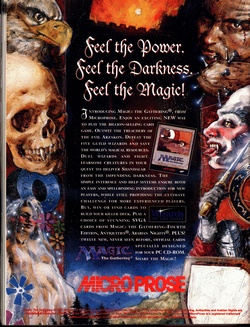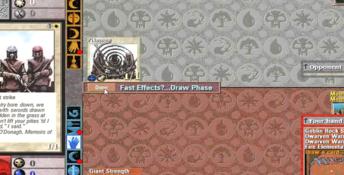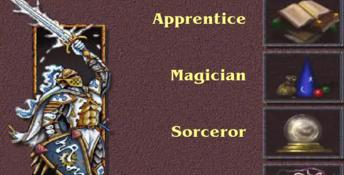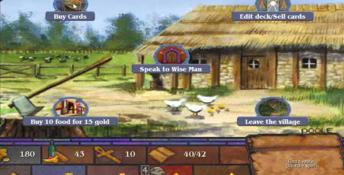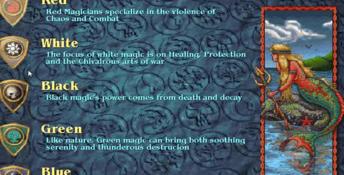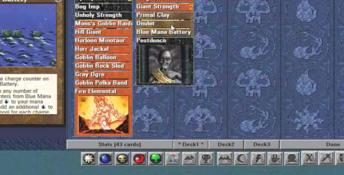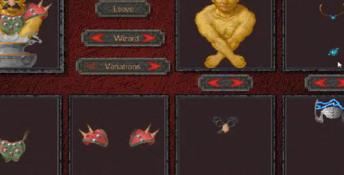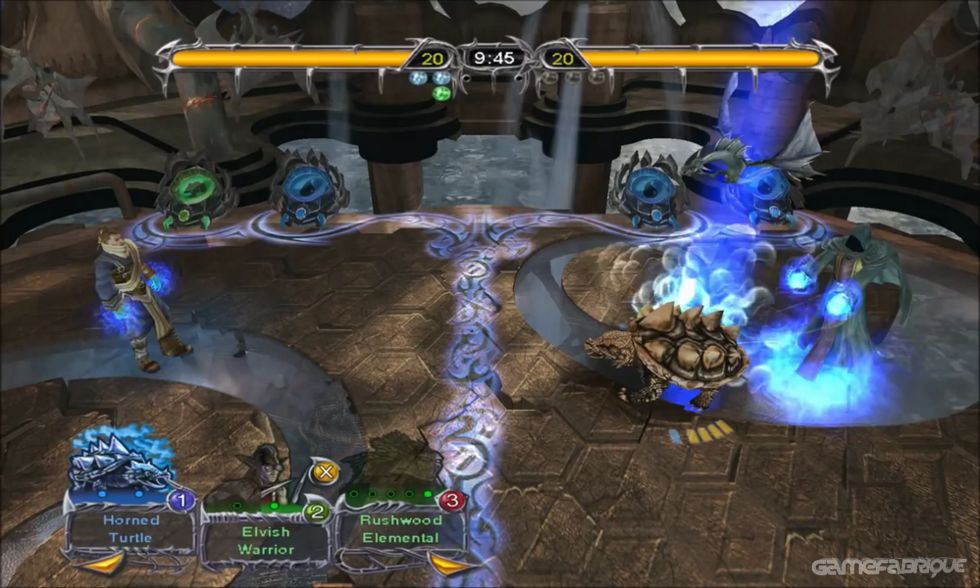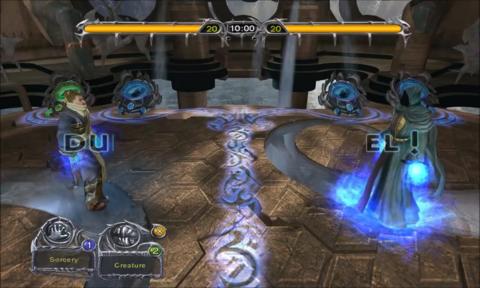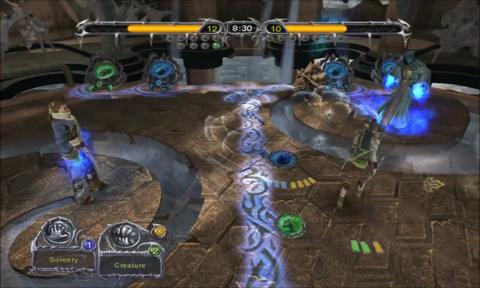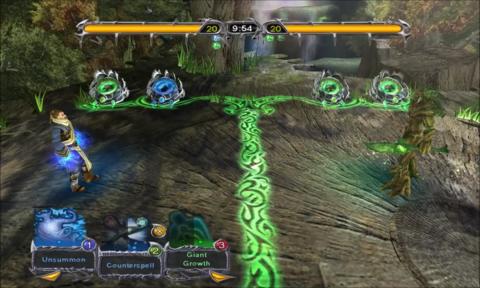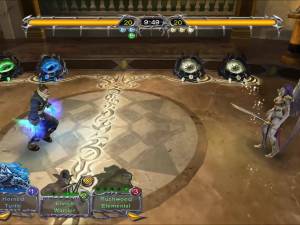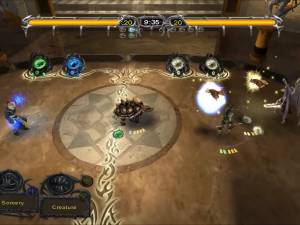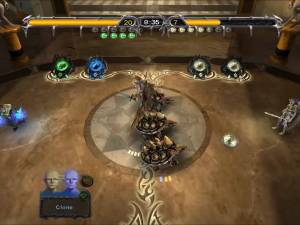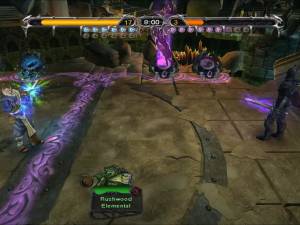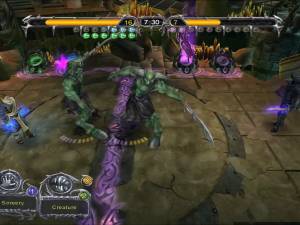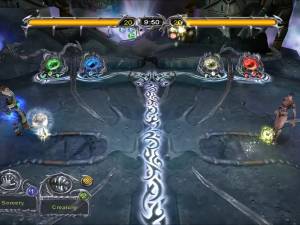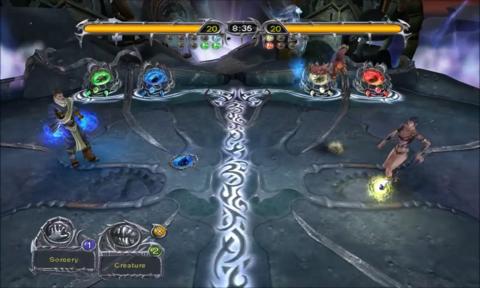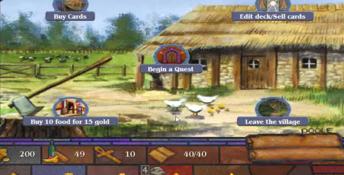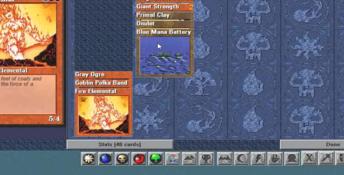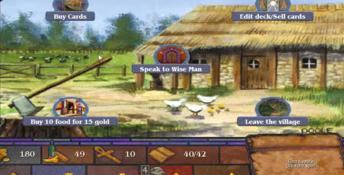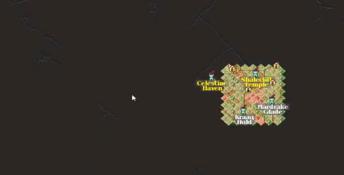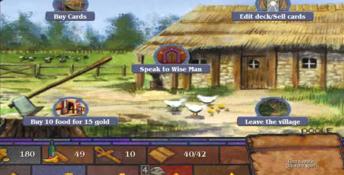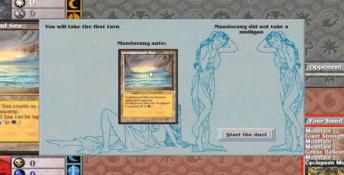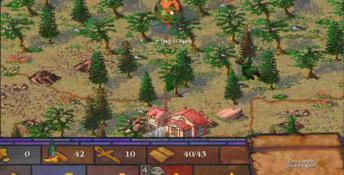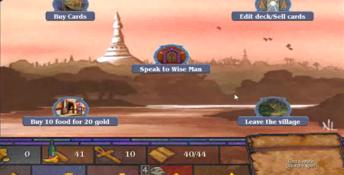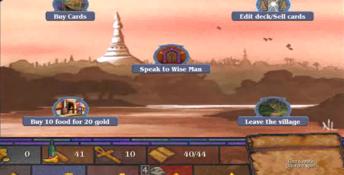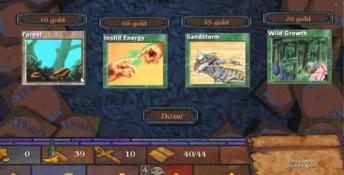Magic The Gathering
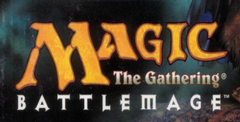
| a game by | Acclaim |
| Genre: | Action |
| Platforms: | PC (1997), Playstation |
| Editor Rating: | 7.9/10, based on 8 reviews, 9 reviews are shown |
| User Rating: | 9.2/10 - 5 votes |
| Rate this game: | |
| See also: | Relaxing Games, Board Games, Magic: The Gathering Games |
Well Top Trumps Was Never 'anorakish' was it? Honestly, it's getting so a man can't have an ordinary hobby without being labelled as some kind of sad, trainspotting, socially unacceptable outcast. It's not as if I'm beheading small babies or exposing myself in public, is it? It's only a game. Okay, so it's got wizards in it! And dragons! And you cast spells and that! It's just a bloody game, that's all! I don't go around thinking I can do magic in real life or anything! I don't go down the shops and say, "Right, give me 20 Rothmans or I'll tap my island and cast a Freeze Newsagent spell on you!" I do drink beer you know! I like women! it's only a sodding game!!! (There, there. Calm down - Ed.) Sob.
Er, anyway...
Social skills notwithstanding, Magic: The Gathering is, in case you live in the blissful town of Unaware or the neighbouring village of Ignorance, a phenomenally successful card game that has swept the world and revitalised the non-computer games industry, much as Dungarees & Drag Queens did back in the '70s (Dungeons & Dragons - Ed.) Now you can't move in the games section of the Virgin Megastore for fear of knocking over a well-stacked display of card decks, covering just about every subject you can think of from Wizards to Modern Warfare to Spaceships and Aliens. There are even the licensed games such as Star Wars, Star Trek, Highlander and any number of Marvel Super Heroes to do battle with.
But Magic was the original and still, most enthusiasts would argue, the best, having sold over 500 million cards across the world since its inception in 1993. The idea is so simple it hurts -you have a deck of cards (spells), you can pick and choose what cards are in that deck from the thousands available - which, naturally, you have to find and buy first - then you 'duel' (as it were) with a 'friend' (so to speak) by casting the spells at each other until one of you drains the other's life points. The spells include monsters to attack with, weapons to do direct damage with and other spells that affect the shape of each game in lots of different ways.
Sid Meier, Wizard at Large
There are two sides to MicroProse's version, a single-player adventure style game that's been designed by avid Magic player and all-round games Buddha, Sid Meier (in his last project for MicroProse before he sets up shop by himself), and a straight one-on-one duel with the computer. The adventure game is designed to act as an introduction to the world of Magic and teaches you about the different elements of the game as you play. The idea is that you are a lone wizard out to save the world by battling other creatures and wizards across the land of Shandalar. Every combat takes the form of a Magic card duel and the player has to build up a collection of cards (spells) as he journeys until he's powerful enough to defeat the ultimate menace. It's the trading aspect that has made Magic into the phenomenon that it is today. Because there are so many different cards and because a large number of them have only limited print mns, getting your hands on certain cards in real life becomes a very tricky affair. It's rather like the days of Panini football stickers from your schooldays (repeat after me: "Got, got, need, got, need, got, got, ooh an Arsenal badge. I'll give you five Ipswich players for it. All right six, and two Steve McMahons..."), the only difference being that a really rare card can fetch anything up to $500 and even the lowliest of common ones can still sometimes prove more useful than anything else in your deck. It's all about strategy. Know your cards, know your deck and know what you need to improve it.
Meier has chosen to implement this vital side of the product into the singleplayer adventure game by including shops and trading caravans in the game world. As the player travels and duels, thus slowly building up his collection of cards, he can visit different shops that will have different cards available either to buy or to trade with. The straight duelling game works by including every card in the real-world starter editions and the first two expansion packs for you to pick and choose from at will. You're probably thinking that's a bit daft, aren't you? Surely everyone will just pick the best cards and have the perfect deck? And you'd be right, if it wasn't for one little thing. There's no such thing as the perfect deck.
It's precisely that reason why Magic has proved so popular. Because there are so many different cards, and because they all work in different ways with each other, as I said, there's no such thing as the one perfect deck. Every card has strengths and weaknesses. Certainly, some are vastly powerful, but there's always a way to beat every deck. That's why strategy is so important in the game: you have to decide in advance which kind of deck is going to be the best bet to beat your opponent. A deck full of quick-to-cast creatures that take a long time to wear your opponent down or a deck that takes its time, setting up its pieces slowly and carefully, then delivering one all mighty knockout blow just before the end? How about a defensive deck that nullifies everything your opponent tries to do but doesn't do a lot of damage in return? The options, like life, are limitless. And since my dearly beloved grandmother used to say, "Always leave them on a metaphor for life'', that's exactly what I'll do.
Duelling all over the world
Once MicroProse have released the first version of Magic to the world and stood back to see how it goes, they'll set about releasing the second version. What's in the second version, you ask? Only the most important feature of all - network options! Yes, forget about Quake, wave goodbye to Command & Conquer, bid farewell to, er, Falcon 3. Multi-player Magic is where the future's at baby, and you'd better book your ticket now, 'cos when this train pulls outta the station, there ain't no one gonna be left on the platform...
Ahem, sorry. Enthusiasm and all that. Networks, servers and of course the Internet will all feature in the second version of the game (which will be an add-on for the first rather than a separate entity), allowing players to start duelling each other right around the world. Finally the global village! The world unites in a common cause. Wars are fought with cards not guns! Gibber.
Download Magic The Gathering

System requirements:
- PC compatible
- Operating systems: Windows 10/Windows 8/Windows 7/2000/Vista/WinXP

System requirements:
- PC compatible
- Operating systems: Windows 10/Windows 8/Windows 7/2000/Vista/WinXP
Game Reviews
People say:
Just to let you know, I've never played the craft game, but luckily that didn't make much of a difference. They've added enough to it to make it completely separate from the card game. Magic: Battlemage really impressed me. I admit my initial reaction was a bad one due to the stereotypical idea of what I thought Magic was all about in any form (thanks to Andy Baran of EGM' fame). After playing the game awhile though, my reaction was proved wrong. The intro FMV looked great, even though the wizards look like they're dancing or doing yoga or something. The interface and territory description screens are really nice-looking, but the duel screens were average--maybe even below average. Imagine Machine Hunter or Loaded on the PlayStation. Now take away any 3-D elements and any lighting effects. That's what the Duel Mode looks like in Magic: The Gathering. The control took me awhile to get used to, and that was after many hours of reading the manual! I ended up really getting into the spell and mana system, but I admit I have a long way to go before I know all of them. Besides the Campaign Mode (which I prefer), there's the straight Duel Mode. It's a good way to start practicing and learning about the effect of various spells. I recommend this one to anyone with an open mind to a different - but good - type of game.
Let's face it. Magic the Gathering fans don't have much out there in terms of video games. If you're a Magic fan, you're going to want to check this game out regardless of what I say (and I think you should). Battlemage is a very complicated strategy game that Incorporates the card game's flavor well. But If you've never played the card game before, you probably would want to skip this one. The intention is good, but the execution falls short.
Even if you're a pro at the Magic phenomenon (and I am not) this video game version will take you a while to learn and master. It's a safe bet it'll appeal to Magic the Gathering's avid fans. At the same time, it'll probably turn off other gamers, who may find Battlemnge's bulky interface and slow-paced gameplay too trying on their patience. Sure, the ability to collect and wield all the game's cards is intriguing. It's just not my thing.
Two important facts: I'm not a big fan of card games and I've never played Magic: The Gathering (nor do I plan to in the future). With that out of the way, let me just say I had difficulty understanding the point of this game. The role-playing overtones are cool but the graphics leave much to be desired. As far as this game is concerned, Magic fans may dig it, but I don't. It's too confusing of a strategy game for my tastes.
Magic, the wildly popular card game that's the biggest RPG sensation since Dungeons and Dragons, finally materializes in the video game world, ready to cast spells of enchantment on all who venture to play.
The Story
Six mighty wizards are lured to the land of Corondor by Ravidel, a ruthless plainswalker who's gone insane from the hardships of war. His desire is that the wizards weaken each other so he can destroy them all, thereby becoming the most powerful creature in the universe. Three of the warring wizards are Conquerors, who are trying to capture as much land and power as possible, while the other three are Defenders, seeking merely to protect the land and people of Corondor from battle and bloodshed.
Gameplay
Magic offers two modes of gameplay: The Duel mode enables one or two players (using a split screen) to engage in Magic-style war, just as if they were playing the card game. This means you battle your opponent with cards that display over 200 creatures, spells, artifacts, and enchantments from the Magic: The Gathering series. In addition to pre-made, random, or custom decks of cards, you can also choose new cards from the expansion deck called Mirage.
The Campaign mode is more like a strategic war-sim adventure where players build armies, research spells, and conquer territories on their way to a final showdown against Ravi-del. When you encounter enemies, play shifts to the Duel mode, where you must once again use spell and creature cards to destroy tt)e enemy and capture his mana.
WitH all the expectations surrounding this game, hopefully Acclaim will pnake some 32-bit Magic this holiday season.
The card game that has taken the country by storm is now ready for a home system launch--and they've added more features, real-time battles, and a hidden character set based on the unpublished "Mirage" series. The two action modes include strategic battles and quick action duels, and you can customize your set with unique creature and spell combinations. Gather round--the Magic will soon be here!
Prepare yourself for the next level of strategy. Magic: The Gathering-BattleMage will be released soon for the PlayStation and Saturn. It is a fully animated strategy game that brings the artifacts, monsters and mystical spells of the Magic universe to life in a battle of wits and wizardry.
The game will contain over 90 interactive encounters across i 30 different territories. BattleMage offers two modes of play. The Duel Mode is a realtime head-to-head game that allows you to build a customized army of creatures and spells that come from the card game. You can play against the computer or against another player on the game's split-screen feature.
You can also engage in a second mode, called the Campaign Mode. This part is a turn-based strategy game in which you conquer territories and accumulate magical artifacts and spells in the midst of an epic war. Throughout this campaign, you will have various encounters with different beings from the Magic universe. Some of these encounters will be in your favor, providing you with silver, spells, artifacts and clues. Some will have adverse effects as well. Each time the Campaign Mode is played, new magical powers can be found, including brand-new, never-before-seen spells.
The strategy aspect in this game is nothing to scoff at. When facing off in the various battlefields, you will have to balance your time between collecting magical energy (called mana) and fighting.
Not only will you have to use spells and artifacts to your advantage, but you will need to utilize the terrain for tactical purposes. For example, use hills to protect a weak flank from a sneak attack, or use a passageway to lure enemy armies into a trap.
This title has enough features and depth to please any strategy fan. And let's not forget the Magic: The Gathering universe and how popular that has become. It looks like this game is going to be a hit when it debuts.
- MANUFACTURER - Acclaim
- THEME - ACTION
- NUMBER OF PLAYERS - 1 or 2
When MicroProse announced it was creating a PC version of the insanely popular card game Magic: The Gathering, gamers rejoiced. What better way to play the complex, often confusing strategy contest than electronically, where a computer can worry about the rules? Unfortunately, the game shipped without multiplayer capability, leaving one of the world's best two-player games one player short.
At long last, MicroProse has released ManaLink, Magic's multiplayer element, which you can download for free and which is also included as part of the game's second CD-ROM expansion, Duels of the Planeswalkers. If you have the software for TEN, Magic's official online service, and the desire to shoot lightning bolts at complete strangers from around the world, ManaLink will make you very happy, indeed.
Pick A Card, Any Card
Traditional paper-card Magic is a game for the rich. Rare, out-of-print cards like the Black Lotus and Mox Sapphire can easily cost hundreds of dollars each. But the PC version comes stocked with these killer cards and many more, so your strategies are no longer limited by your wallet.
Assembling an online deck is extremely easy; simply choose your cards from Magic's collection of 700 or so at the bottom of the screen and drag them into the main window. Save your deck to a disk and you can trade it with your friends, or just use it to trade blows with your enemies.
When you log onto TEN, ManaLink automatically launches and registers your name with the server. A window opens to let you chat and challenge other players; once two people agree on the parameters of the game (which decks are allowed, how many rounds, etc.), it's off to war on the magical planes.
Fresh Blood
The free Magic lobby of TEN matches up players from around the world. Fortunately, latency isn't much of a problem, even in international matches; finding a quick-playing opponent, however, is another matter. Magic strategy demands player concentration, and most usually take their time. However, it's a bummer that you can't do simple, local things like adjust your desktop settings or card layout while you wait for your opponent. These may be fixed, however, as player feedback pours in.
The Aduentures or ManaLink
ManaLink is currently available from MicroProse's Web site.
An immensely popular card game. Magic: The Gathering descends on the PC with snazzy teatures and gameplay. New players can learn the fundamentals via a thorough multimedia tutorial, then duel the A.I. in a variety of modes.
More than 100 beautifully drawn decks prepare you for battle, and the useful Deck Builder utility organizes the whole deal. MicroProse also threw in an adventure game where players battle wizards and other mythical creatures with their Magic cards, building up their decks and characters along the way.
Based on the hugely popular card game from Wizards of the Coast, Magic: The Gathering is a fantasy/strategy game where different cards give players special powers like spells and magic.
To capture the aspects of the card game, MicroProse created two modes. The Apprentice mode helps beginners learn the game as they play with any deck against the computer or in a simple quest-based game. In the multiplayer mode, gamers challenge each other online, either in head-to-head duels or in larger networked groups. Special care has been taken to translate the art styles of the cards authentically into Super VGA graphics.
Overview
I was skeptical when I first heard that Acclaim was going to attempt to transform Magic: The Gathering into a PC game. I'll admit it -- I was among those throngs of people that funneled paycheck after paycheck into the procurement of Magic cards (and occasionally food), watching the trade magazines for the release dates on the next collection in the series, planning my strategies, looking for some poor sucker with a few Hurloon Minotaurs and a Scryb Sprite to take to the mystical cleaners. If you don't know what I'm talking about, then you're among the lucky ones, for the original Magic: The Gathering was, and is, an amazing phenomenon.
Magic is a turn-based card game released by a Seattle area company called Wizards of the Coast. It combines just the right amount of luck, strategy, and quick thinking into a game that, amazingly, is never the same twice.
It was aptly named. Magic quickly swept the nation and the world, increasing in popularity until Wizards had released over a thousand different cards! Selling and trading was out of this world. The cards, sold in packs of 10 and 60 and starting initially at only a few pennies apiece, began to gain in value. Today, some of the more valuable ones can go for several thousand dollars each. I can't get that much for my car!
But aside from the value of the cards, Magic is fun. Continuously. My friends and I would play for as long as we could without sleep and sustenance. Then, as soon as we recharged, we'd be right back at it. I hear they're experimenting with using this game as an alternative for Methadone! It's that good.
But I tell you all this to give you an idea of the barrier Acclaim approached, right from the get-go, in taking on the task of successfully converting Magic: The Gathering into Magic The Gathering: BATTLEMAGE.
They almost pulled it off.
Gameplay
Here's the plot: the powerful planeswalker (magic user), Ravidel, has summoned the seven most powerful mages in the world of Dominaria to gather in Corondor, a continent of diverse creatures and domains which is divided, temporarily, into 30 neutral territories. The mages, of course, all know each other -- two women, three men, a minotaur and a demon, with more sub-plots between them than the staff of General Hospital. They have been well written, however, and the conflicts between them give them a good sense of individual identity and solidify the story behind the game.
The magic in the Battlemage universe draws its power from different terrain, resulting in five different types of available power: Black (death magic, drawn from swamps), White (life magic, from plains), Red (fire magic, from the mountains), Blue (water magic, from the oceans) and Green (earth magic, from the forests). Each has its strengths and weaknesses. Red, for example, has some incredibly devastating spells, but it's not much for flying creatures. To counter this, most successful players use two different colors to construct their deck, and that's what Acclaim has done with these seven mages. You can play a campaign from each mage's point of view, using their particular color combination. This option gives the game a lot of replayability.
You start each campaign with a set number of spells, creatures and land in your tome, and select from these to create the combination you will use in your battles around Corondor. Turn by turn, you and your adversaries negotiate with neighboring neutral territories for alliance and goodies, and fight each other for the territories that have already fallen under one mage or another's control. As you progress, capturing land, you will gain new cards to add to your arsenal.
Each turn, you may make one attack on a new territory. Initially, each player has one territory and all the others are neutral. When you attack these neutral territories, you often encounter the local denizens and engage in detailed conversations with them. The interaction here is of the Choose Your Own Adventure type. The individual you're dealing with makes a statement, then you get a choice of three responses. Choose correctly throughout the conversation, and they'll give you information, or spells and creatures, or they might even turn the territory over to you, no battle required! This even works when one of your opponents controls the space. Of course, say the wrong thing to them and they'll send you packing, sometimes leaving your spell book or your purse a bit lighter for your troubles. This system works very well, with a few noticeable exceptions that I'll get to later. Right now, I want to get to the real meat of the game: the battle system.
Eventually, you'll come across a territory that you want and your opponent has, and no amount of bargaining is going to get it for you. You're going to have to fight for it. But that's what you're playing for, isn't it?
You get to look at seven cards from your deck at a time, adding new ones as you use them up. Just as in the card game, you bring out land cards from your deck for use in summoning creatures and casting spells. As I said before, Magic the card game uses a turn-based system, which gives you plenty of time to plot each move, budget your resources and plan strategy. In Battlemage, Acclaim has taken the risky step of changing that aspect. Everything is real-time, although you may pause the game to peruse your cards. You bring land out, cast spells, and "sic" your various nasty monsters on your enemies in an attempt to drain their life points as quickly and efficiently as possible. There's a limit on how fast you can bring out land, and casting spells temporarily uses up this land power (called mana). Also, each time you cast a spell or summon a monster, it takes a few seconds, so there are controls on how fast you can attack. It's a tricky switch for veterans of the card game, but once you get used to it, I think you'll enjoy the pace. If Acclaim had stuck with the original system, this would be one seriously long game, and I doubt they could create an AI smart enough to give human players a decent challenge. So this new, high-speed Magic relies on human fallibility under pressure to even the score between person and machine.
Controls are a bit confusing at first, but once you get used to them they're actually quite well laid out. "A" and "D" scroll through the cards in your hand, and "T" activates them. With your mouse, you select the creatures you wish to command and designate targets for attack. Some creatures have special abilities which you access by selecting them, then right-clicking. A menu pops up showing what power you can use and how you use it, as well as listing any enchantments that might be on that creature. You become quite adept at doing one thing with your keyboard hand, while attending to another simultaneously on the mouse.
The battle continues until either you or your opponent has lost 20 life points. Lose on offense, and you lose nothing overall, except your turn. Lose on defense, and you lose whatever territory was attacked, along with the land magic it provides to your arsenal.
Acclaim's real-time system has captured much of the strategy and counter-strategy that made the card game so great, although because of the limits of the medium, some nuances cannot be exploited.
Graphics
Magic is a pretty game. The artwork for the characters is straight out of the comic pages, giving them a dynamic feel. The interfaces are beautifully constructed in SVGA. Best of all, several hundred of the most popular Magic cards have been used for the game with their original artwork.
You can enter the archive and view all the cards, with an explanation of what they do and any special powers they have. You can also enter the Tome Builder, where you can construct custom decks from all the available cards to be used in single duel mode against one of the computer opponents, or with a friend via modem.
Each new land in the campaign mode has a specific painting, which you see when you attack the first time. Corondor is a nice place, with majestic mountains, frozen wastes, sweeping valleys containing sprawling villages, and massive floating cities. Most are paintings with a little animation for water effects, but they're delightfully detailed. The artist responsible for these illustrations should be commended for doing such beautiful work.
The introduction for the game is also terrific. It's about four minutes long, briefly explaining the plot and then taking full advantage of DirectX to create a fantastic 3D battle between two perturbed sorcerers. It's wicked! The two hooded mages furiously weave spells of light between their undulating hands as the earth cracks around them, belching fire and smoke. Skeletons clamber from the cracks, with swords and malicious grins that put Jason and the Argonauts completely to shame. A huge Djinn is summoned from the air to take care of the skeletons and kick one of the mages off a cliff. Then, just when you think it's over, the fallen mage comes back up over the precipice, riding on the back of a giant tarantula! This is a truly great scene.
Perhaps the weakest link, graphically, is the combat. You view the battlefield from directly overhead, scrolling around with your mouse to find your enemies and send your creatures to them. Each territory you fight in has a different terrain, beautifully detailed, with trees and rocks and ruins to hinder your land creatures as they stomp and claw around taking chunks out of your foes. Each creature summoned has its own little icon, fully animated, and each spell you cast has a specific shape as well. "Steal Artifact" is a tiny, grasping hand that flies across the screen and grabs your opponent's current toy. "Mana Short" is a rose that settles on your enemy, then wilts away its petals. Clever and mystical -- a lot of time has been spent to make you feel like you're really summoning these creatures and spells. Where they fall short is in size. You could fit most of your army on a quarter, and still read the minting date. They're just not big enough. It's more like summoning a stick to poke into your backyard anthill. It's too bad, because what they've done with the tiny space they've allotted for themselves is impressive. Despite this, the different items are distinct enough that you can effectively play the game, and the graphic feel overall is excellent.
Audio
The music is great -- ethereal, wispy, with deep resonating bass and orchestral scores that are a constant presence wherever you are in the game. There is never a period of silence, which I appreciate, and the music has no noticeable repetition to it.
In battle, whenever you summon or cast, a voice says the name of the spell. It not only sounds cool, but it lets you know what your opponent is whipping up for you, just off screen. The creatures grunt and snort at each other. You can hear the tink of claw on metal and the death cries of the vanquished. Here again, Acclaim has spent a great deal of time to create the right atmosphere for this game.
Problems
I said that Acclaim almost accomplished the task they set out to do, and so far, it seems I've had only minor complaints. Well, get comfy, because this section will take a bit. With all its beautiful graphics, well-developed storyline and clever adaptations, Magic The Gathering: Battlemage has some serious flaws.
First of all, although the box says that anyone can play, if you've never played Magic before, it will take you a very long time to figure out what on earth you're supposed to do. The manual gives a general idea, but trial and error will be your best bet -- and in a game with as many subtle nuances as Magic, you may end up using the CD as a coaster before you get to the point where you can win a battle. Acclaim is fooling themselves if they think this game is easily accessible to everyone.
The interface is well laid out, but interacting with your creatures is very difficult. Most of your monsters move really fast, and grabbing them in the heat of battle takes a steady hand and keen coordination. Using their special powers takes too much time, and finding just the right place to click on the screen is frustrating when you're being slaughtered by a gang of goblins.
Any time you want to attack your opponent with a newly-summoned creature, you have to select your minuscule beastie (a chore in itself), then scroll all the way across the screen to target the bad guy. A "quick-key" should have been included to allow you to send newly-summoned monsters on the warpath right away, since rarely will you find yourself targeting something besides your opponent's icon. Should you forget to assign a creature to attack, it will sit there dumbly until you DO give it a job. If they had made unassigned creatures automatically block, it would be a great enhancement to the game.
Spellcasting has its quirks as well. Most of the spells work fine, but a few are really annoying. Death Ward, the cornerstone of many a Magic deck in my youth, can be cast on a creature to prevent its demise. Unfortunately, it has been rendered useless in Battlemage because you can't cast it in time. The spell takes some three to four seconds to cast while your creature languishes on the field, and by the time it gets to the corpse, it's rotted away into the sod -- a complete waste of a spell.
When an opponent charms one of your creatures and sends it after you, there is a dispel you can cast. This little number has the effect of removing the enchantment icon, a little ball that orbits your creature, but the little bugger keeps coming! So once your opponent gets hold of one of your team members, he's got them and you're done for. Kind of like professional basketball.
Another thing that bugs me is that during campaigns there is no way to access the archive, except to save and quit your game, then go back to the main screen. This means that every time you get a new card, you have to quit to find out what it does. It seems to me a better solution would have been to have a direct link from the campaign screen to the archives.
The Artificial Intelligence is also poor. All your land creatures get totally confused by the terrain. There's too much going on at once in this game for you to have to coddle your creatures to their target. Countless battles were lost because my huge legion of fire-breathing, snarling, bloodthirsty Death-On-Claws was being held off single-handedly by a tree! Fortunately, flying creatures go right over everything, which saved my butt more than once.
Wait! I'm not done!
While I liked the idea of having non-player characters to interact with when you enter a new territory, sometimes they can be a bit tedious. You have to attack some territories three or four times, talking to different characters, before you actually get anything for your trouble. After fighting a zillion duels, with Ravidel on the ropes and one slimy little territory remaining before your ultimate victory, this aspect gets completely frustrating. Especially when you have to fight a defense against your opponent between each interaction.
But what finally turned me against this game, what made me say that Acclaim has not accomplished their goal successfully, is the fact that after fighting countless duels, dealing with tons of characters and blowing off all your other work for three days so you can finish the game, THERE ARE NO END SCENES! I don't care what era of PC gaming you're from -- the good games have always had some kind of reward for a job well done. Battlemage prints a little green sign at the bottom of the screen which says "You Have Won The Game." That just plain doesn't cut it -- especially after the incredible intro. They can't say that they didn't have the talent on their staff. It stinks heavily of rushing the release date, and completely ruined for me what would have otherwise been a well-rounded, enjoyable game.
System Requirements
Windows: Windows 95, Pentium 75 (90 MHz recommended), 16 MB RAM, 2X CD-ROM drive, 2 MB DirectX compatible PCI video card, and at least 50 MB free hard drive space (110 for a full install). Modem or LAN for network play
Reviewed on: P-133 with all the aforementioned stuff and then some. It ran great!
Bottom Line
Obviously, I had problems with this game, but I don't think it's a total loss. It's beautifully constructed, and most of the interface is nicely done. Acclaim did far better than I expected with a tough project like this. Magic players will still like this game for its fast pace and the ability to play by modem. The combat also is not bad, but because of the AI and other difficulties I mentioned, I think it could be a lot better. If Acclaim went back and corrected the glaring problems, as well as throwing in cut-scenes for the end, I would be the first one in line to buy a copy. Until then, this game reaps a meager 79, and I sit back to await Microprose's version of Magic: The Gathering.
Snapshots and Media
PC Screenshots
Playstation Screenshots
See Also
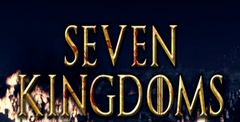 Seven Kingdoms
Seven Kingdoms
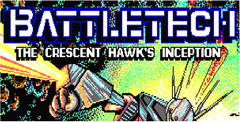 BattleTech: The Crescent Hawks' Revenge
BattleTech: The Crescent Hawks' Revenge
 Dune: The Building of a Dynasty
Dune: The Building of a Dynasty
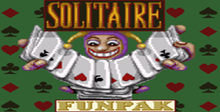 Solitaire Funpak
Solitaire Funpak
 The Eye of Judgment
The Eye of Judgment
 Life & Yahtzee & Payday
Life & Yahtzee & Payday
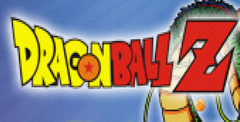 Dragon Ball Z: Collectible Card Game
Dragon Ball Z: Collectible Card Game
 Dai Konsen
Dai Konsen
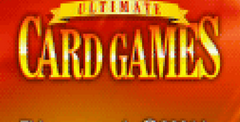 Ultimate Card Games
Ultimate Card Games Pokemon Trading Card Game
Pokemon Trading Card Game Monopoly
Monopoly
 Timeline
Timeline
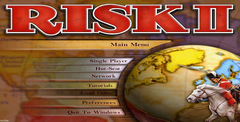 Risk II
Risk II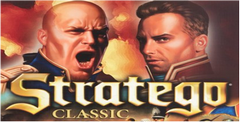 Stratego
Stratego
 Tunnels & Trolls: Crusaders of Khazan
Tunnels & Trolls: Crusaders of Khazan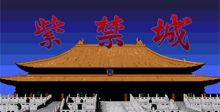 Shi Kin Joh
Shi Kin Joh
